人教版高中英语必修五随堂练习Unit 5
- 格式:doc
- 大小:63.00 KB
- 文档页数:9
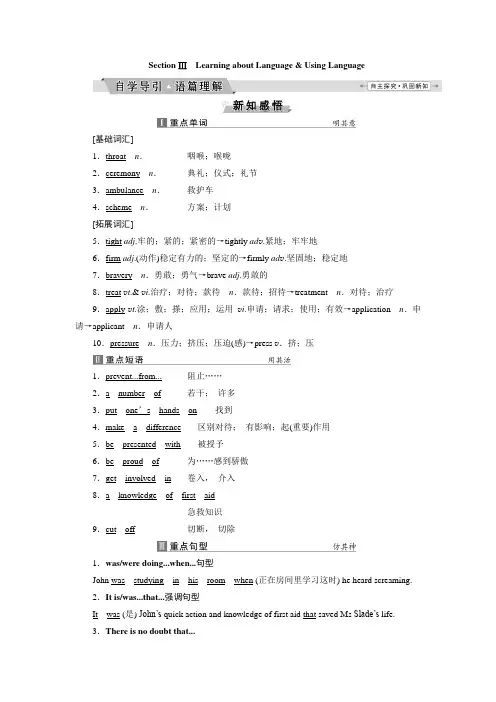
Section ⅢLearning about Language & Using Language[基础词汇]1.throat n.咽喉;喉咙2.ceremony n.典礼;仪式;礼节3.ambulance n.救护车4.scheme n.方案;计划[拓展词汇]5.tight adj.牢的;紧的;紧密的→tightly ad v.紧地;牢牢地6.firm adj.(动作)稳定有力的;坚定的→firmly ad v.坚固地;稳定地7.bravery n.勇敢;勇气→brave adj.勇敢的8.treat v t.& v i.治疗;对待;款待n.款待;招待→treatment n.对待;治疗9.apply v t.涂;敷;搽;应用;运用v i.申请;请求;使用;有效→application n.申请→applicant n.申请人10.pressure n.压力;挤压;压迫(感)→press v.挤;压1.prevent...from... 阻止……2.a__number__of 若干;许多3.put__one’s__hands__on 找到4.make__a__difference 区别对待;有影响;起(重要)作用5.be__presented__with 被授予6.be__proud__of 为……感到骄傲7.get__involved__in 卷入,介入8.a__knowledge__of__first__aid急救知识9.cut__off 切断,切除1.was/were doing...when...句型John was__studying__in__his__room__when (正在房间里学习这时) he heard screaming.2.It is/was...that...强调句型It__was (是) John’s quick action and knowledge of first aid that saved Ms Slade’s life.3.There is no doubt that...There__is__no__doubt__that (毫无疑问) John’s quick thinking and the first aid skills he learned at school saved Ms Slade’s life.Read the text and then choose the best answer according to the text.1.John slowed the bleeding of the injuries by________.A.dressing them in tea towelsB.putting pressure on the woundsC.dressing them in bandagesD.keeping Anne Slade lying still2.From this accident, we can see________.A.the Young Lifesaver Scheme is a health care organizationB.a knowledge of first aid is helpful in lifeC.it was only John’s quick thinking that saved a lifeD.everyone should be alert against crimes3.In the last paragraph, the writer mentioned the Prime Minister in order to show________.A.the Prime Minister also attended the Young Lifesaver SchemeB.it is a great honor to be awarded by the Prime MinisterC.Anne Slade works in the governmentD.the government is concerned about life safety答案:1-3.BBDHEROIC TEENAGER RECEIVES AW ARDSeventeenyearold teenager,John Janson,was honoured①at the Lifesaver Awards last night in Rivertown for giving lifesaving first aid on his neighbour after a shocking knife attack.John was presented with②his award at a ceremony③which recognized the bravery④of ten people who had saved the life of another.John was studying in his room when he heard screaming⑤.When he and his father rushed outside,a man ran from the scene⑥.They discovered that Anne Slade,mother of three,had been stabbed⑦repeatedly with a knife.She was lying in her front garden bleeding very heavily⑧.Her hands had almost been cut off⑨.It was John’s quick action and knowledge of first aid that saved Ms Slade’s lifeB10.He immediately asked a number of⑪nearby people for bandages,but when nobody could put their hands on⑫any,his father got some tea towels and tape from their house.John used these to treat⑬the most severe injuries to Ms Slade’s hands.He slowed the bleeding by applying⑭pressure⑮to the wounds until the police and ambulance⑯arrived.①be honoured 感到荣幸;受到嘉奖②be presented with 被授予③ceremony['serImənI]n.典礼;仪式;礼节④bravery['breIvərI]n.勇敢;勇气⑤be doing...when...为重要句式,意为“正在做……,突然……”。
![[高中英语校本练习]必修5Unit5随堂练](https://uimg.taocdn.com/97c51b17168884868662d64e.webp)
高二英语必修5unit5随堂练校本练习姓名:Ⅰ.核心必记单词1.aid n.& v t( )2.poison n( ).;v t.( )→adj.( )3.variety n.( )→adj.( )4.tight adj( ).→ad v.( )5.firm adj( ).→ad v.( )6.bravery n.( )→adj.( )7.treat v t.& v i( ).;n.( )→n.( )8.apply v t.;v i.( )→adj.( )→n( )→n.( )9.pressure n.Ⅱ.阅读识记单词10.temporary adj.11.injury n.( )→v.12.bleed v i.& v t.( )→n.( )→n.( )d adj.( )→ad v.( )14.heal v t.& v i.15.swell v t.& v i.( )→adj.( )16.unbearable adj.17.vital adj.18.symptom n.19.pour v t.& v i.20.ceremony n.高频短语:1.fall ill2.prevent...from3.electric shock4.squeeze out5.over and over again6.in place7.a number of8.put one’s hands on9.apply to10.make a differenceⅠ.单句语法填空1.— Did you enjoy the party?—Yes.We ________(treat) well by our hosts.(2015·北京,22)2.With the local community _______ (aid) us with our investigation,we soon found out the criminal.3.Americans see eating as something ________ (squeeze) between the other daily activities.(2014·陕西,阅读C)4.It was so hot that he was sweating a lot and his shirt was sticking ________ his back.5.I'm writing to apply ________ the position as a student volunteer.(2015·陕西,书面表达)6.These days,I can't fall asleep because the coming final exam is putting great ________ (press) on me.7.What's worse,some drivers,cyclists and pedestrians do not think ________ vital to obey traffic rules.(2015·江苏,书面表达)8.It is so cold that you can't go outside unless fully ________ (cover) in thick clothes.(2015·江苏,26)9.It is essential that these application forms ________ (send) back as early as possible.10.One day,the cow was ________ (eat) grass when it began to rain heavily.(2015·广东,语法填空)Ⅱ.单句改错(每句仅1处错误)1.There is no doubt whether global warming is a security threat to us all.2.They have retrained the number of young technicians for our factory.3.Much damage has done to the car; you'd better get it repaired.4.Though I told him over and over again to be careful when driven,he wouldn't listen.5.Whether he could get the support from his parents made great difference to the plan.6.She was watching TV while the doorbell rang.。
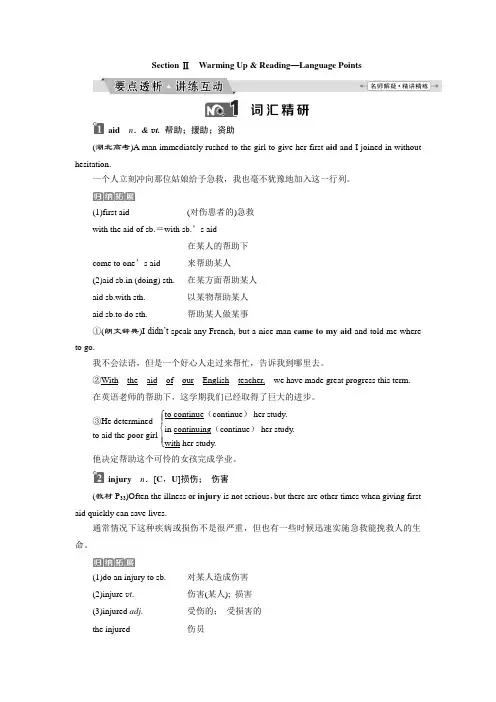
Section Ⅱ Warming Up & Reading —Language Pointsaid n .& v t. 帮助;援助;资助(湖北高考)A man immediately rushed to the girl to give her first aid and I joined in without hesitation.一个人立刻冲向那位姑娘给予急救,我也毫不犹豫地加入这一行列。
(1)first aid (对伤患者的)急救with the aid of sb.=with sb.’s aid在某人的帮助下 come to one ’s aid 来帮助某人(2)aid sb.in (doing) sth. 在某方面帮助某人aid sb.with sth.以某物帮助某人 aid sb.to do sth. 帮助某人做某事①(朗文辞典)I didn’t speak any French, but a nice man came to my aid and told me where to go.我不会法语,但是一个好心人走过来帮忙,告诉我到哪里去。
②With__the__aid__of__our__English__teacher,__we have made great progress this term. 在英语老师的帮助下,这学期我们已经取得了巨大的进步。
③He determined to aid the poor girl ⎩⎪⎨⎪⎧to continue (continue ) her study.in continuing (continue ) her study.with her study.他决定帮助这个可怜的女孩完成学业。
injury n .[C ,U ]损伤; 伤害(教材P 33)Often the illness or injury is not serious ,but there are other times when giving first aid quickly can save lives.通常情况下这种疾病或损伤不是很严重,但也有一些时候迅速实施急救能挽救人的生命。

人教新课标英语必修5Unit5 First aid同步练习及参考答案Unit Five First aidI. 根据下列句子意思用所给词的正确形式或所给汉语填空1.The first a skills are of great use when needed.2.She cut her finger on a piece of glass and it is b.3.While playing football one of his a sprained and he can’t walk now.4.When you get b, it is best to place burns under gently running water for about 10 minutes.5.The skin is one of the o of our body.6.This kind of mushrooms contains a deadly p. You can’t eat them.7.I got an e shock from that faulty light switch.8.When you get injured, you can slow the bleeding by applying p to the wound.9.You must have _________ (imagine) to write a good play.10.He has a wide k___________ of painting and music.11.If there was any disappointment it was probably ____________.(暂时的)12.“I'm not meddling,” To m said ___________ (温和地), “I'm just curious.”13.To me his latest film which other people are crazy about is just ____________ (难以忍受的).14.I realized I had to overcome the language _________ (障碍) when I went to a foreign country.15.After that traffic accident, Mr. Smith’ eyes were so __________ (肿的), she could hardly see.16.Children are all walked barefoot across the _________ (潮湿的) sand to the water’s edge.17. The wind was so heavy that I pulled my scarf more ___________ (紧紧地)round my neck.18. They had faced one difficulty after another with _________ (无畏) and dedication.19. It might be ____________ (有所助益) to consider your attitude to an insurance policy.20. It is _________ (很重要) to get support from those closest in these trying times.II、完形填空阅读下列短文,从每题所给的四个选项(A、B、C和D)中,选出最佳选项。
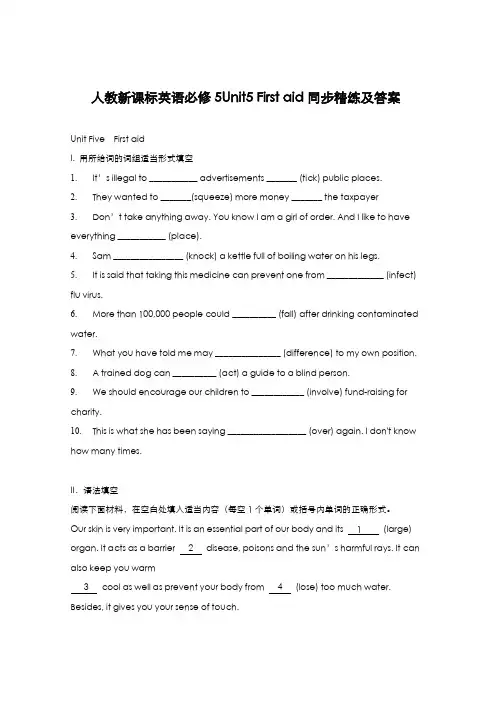
人教新课标英语必修5Unit5 First aid同步精练及答案Unit Five First aidI. 用所给词的词组适当形式填空1.It’s illegal to ___________ advertisements _______ (tick) public places.2.They wanted to _______(squeeze) more money _______ the taxpayer3.Don’t take anything away. You know I am a girl of order. And I like to have everything ___________ (place).4.Sam ________________ (knock) a kettle full of boiling water on his legs.5.It is said that taking this medicine can prevent one from _____________ (infect) flu virus.6.More than 100,000 people could __________ (fall) after drinking contaminated water.7.What you have told me may _______________ (difference) to my own position.8. A trained dog can __________ (act) a guide to a blind person.9.We should encourage our children to ____________ (involve) fund-raising for charity.10.This is what she has been saying __________________ (over) again. I don't know how many times.II.语法填空阅读下面材料,在空白处填入适当内容(每空1个单词)或括号内单词的正确形式。
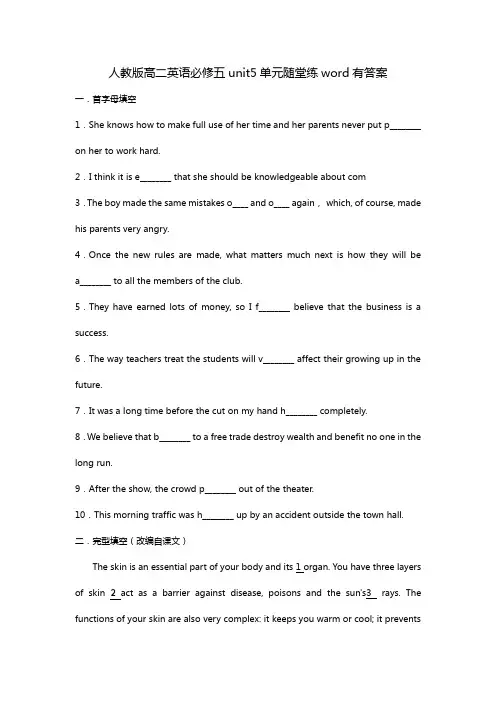
人教版高二英语必修五unit5单元随堂练word有答案一.首字母填空1.She knows how to make full use of her time and her parents never put p________ on her to work hard.2.I think it is e________ that she should be knowledgeable about com3.The boy made the same mistakes o____ and o____ again,which, of course, made his parents very angry.4.Once the new rules are made, what matters much next is how they will be a________ to all the members of the club.5.They have earned lots of money, so I f________ believe that the business is a success.6.The way teachers treat the students will v________ affect their growing up in the future.7.It was a long time before the cut on my hand h________ completely.8.We believe that b________ to a free trade destroy wealth and benefit no one in the long run.9.After the show, the crowd p________ out of the theater.10.This morning traffic was h________ up by an accident outside the town hall. 二.完型填空(改编自课文)The skin is an essential part of your body and its 1 organ. You have three layers of skin2 act as a barrier against disease, poisons and the sun's3 rays. The functions of your skin are also very complex: it keeps you warm or cool; it preventsyour body from4 too much water; it is where you feel cold, heat or pain and it gives you your sense of touch. So as you can imagine, if your skin 5 burned it can be very serious. First aid is a 6 important first step7 the treatment of bums.Causes of burnsYou can get burned by 8variety of things: hot liquids, steam, fire, radiation (by being close to high heat or fire, etc), the sun, electricity or chemicals.Types of burnsThere are three types of burns. Burns are called first, second or third degree burns, depending 9 which layers of the skin are burned.◎First degree burns These affect 10 the top layer of the skin. These burns are not serious and should feel 11 within a day or two. Examples include mild sunburn and burns caused by touching a hot pan, stove or iron for a mordent.◎Second degree burns These affect 12 the top and the second layer of the skin. These bums are serious and take 13 weeks to heal. Examples include severe sunburn and bums caused by hot liquids.◎Third degree burns These affect all three layers of the skin and14 tissue and organs under the skin. Examples include burns 15 by electric shocks, burning clothes, or severe petrol fires. These burns cause very severe injuries and the victim must go to 16 at once.Characteristics of burnsFirst degree burns◎dry, red and mildly swollen◎mildly painful◎17white when pressedSecond degree burns◎rough, red and swollen◎blisters◎watery surface◎18 painfulThird degree burns◎black and white and charred◎swollen; often tissue under them can 19◎little or no pain if nerves are damaged; maybe pain 20 edge of injured area.1.A large B. largest C. big D. biggest2. A which B. what C. when D. where3. A harm B harmful. C usage D. usefull4. A lose B. lost C . loses D. losing5.Aget B. gets C. getting D. got6. A very B. much C. too D.so7. A on B .in C. for D.by8. A a B . an C. the D. this9. A on B .in C. for D.by10. A just B. very C. only D hardly11. A good B . well C. nice D. better12. A either B . all C. both D. every13. A few B. a few C .little D. a little14. A some B. many C .any D .much15. A to cause B . caused C. causing D .causes16. A the hospital B. a hospital C .hospital D. hospitals17 A is B . turn C. come D. look18. A so B . extremely C. extreme D. much19. A see B .to see C . seen D.be seen20. A round B. around C . beside D. inside三短文改错Air travel has three advantage over train travel. First, it can save much time. We can fly from one place to other in a long time, but by train we have to spend more time. Second, air travel is more comfortable because the plane flies so smooth that we can have a good rest during the trip. Third, the train is crowding sometimes and passengers have to sit for a long time, what makes them tired. But train travel also has it's own advantages. For an example, traveling by train cost only a little money. Besides this, we can enjoy the view out the train's windows.答案一.Pressure, essential, over over, applied, firmly, vitally, healed, barriers, poured, held二.1-5AABDB 6-10AABBC 11-15DCBCB 16-20CBBDB三.Air travel has three advantag eadvantagesover train travel. First, it can savemuch time. We can fly from one place to othe ranotherin alon gshorttime, but by train we have to spend more time. Second, air travel is morecomfortable because the plane flies so smoot hsmoothlythat we can have a goodrest during the trip. Third, the train is crowdin gcrowdedsometimes and passengers have to sit for a long time,wha twhich makes them tired. But train travel also has it'sitsown advantages. For anexample, traveling by train cos tcostsonly a little money. Besides this, we can enjoythe view out ∧ofthe train's windows.。
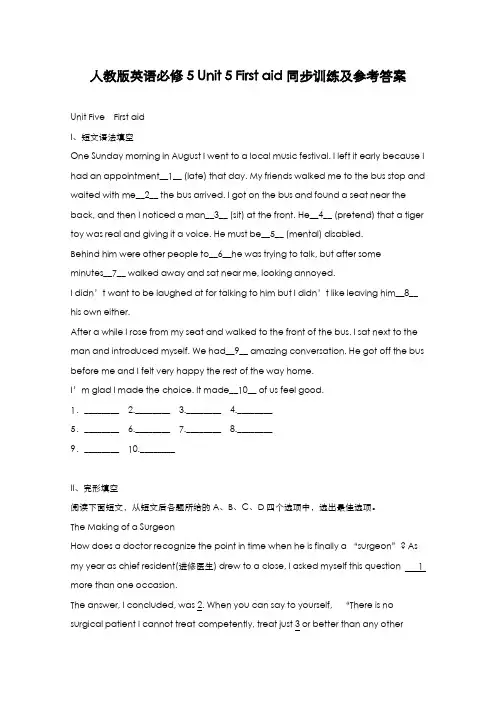
人教版英语必修5 Unit 5 First aid同步训练及参考答案Unit Five First aidI、短文语法填空One Sunday morning in August I went to a local music festival. I left it early because I had an appointment__1__ (late) that day. My friends walked me to the bus stop and waited with me__2__ the bus arrived. I got on the bus and found a seat near the back, and then I noticed a man__3__ (sit) at the front. He__4__ (pretend) that a tiger toy was real and giving it a voice. He must be__5__ (mental) disabled.Behind him were other people to__6__he was trying to talk, but after some minutes__7__ walked away and sat near me, looking annoyed.I didn’t want to be laughed at for talking to him but I didn’t like leaving him__8__ his own either.After a while I rose from my seat and walked to the front of the bus. I sat next to the man and introduced myself. We had__9__ amazing conversation. He got off the bus before me and I felt very happy the rest of the way home.I’m glad I made the choice. It made__10__ of us feel good.1.________ 2.________ 3.________ 4.________5.________ 6.________ 7.________ 8.________9.________ 10.________II、完形填空阅读下面短文,从短文后各题所给的A、B、C、D四个选项中,选出最佳选项。
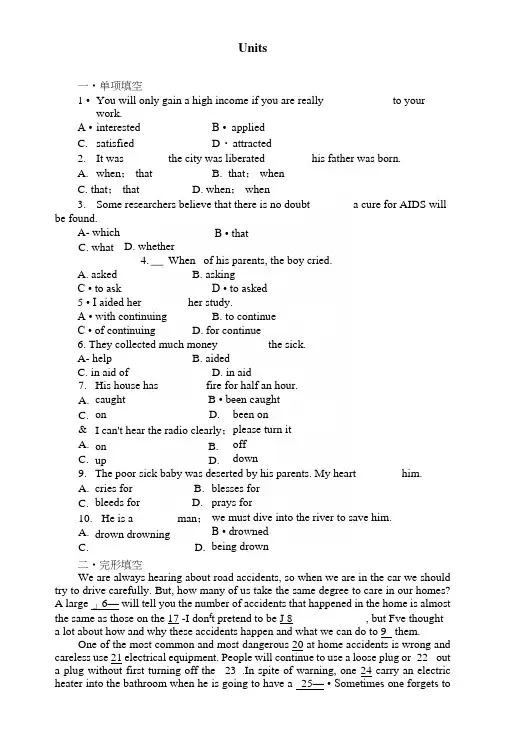
Units一•单项填空1 • You will only gain a high income if you are really ___________ to your work.A • interestedB • appliedC. satisfied D ・ a ttracted2. It was _______ the city was liberated ________ h is father was born.A. when ; thatB. that ; whenC. that ; thatD. when ; when3. Some researchers believe that there is no doubt _______ a cure for AIDS will be found.A- which D. whether4. __ When of his parents, the boy cried.A. askedB. askingC • to askD • to asked5 • I aided her ________ h er study.A • with continuing B. to continueC • of continuing D. for continue6. They collected much money ________ the sick.A- help B. aidedC. in aid ofD. in aid二•完形填空We are always hearing about road accidents, so when we are in the car we should try to drive carefully. But, how many of us take the same degree to care in our homes?A large 」6— will tell you the number of accidents that happened in the home is almostthe same as those on the 17 -I don f t pretend to be J 8 , but Fve thought a lot about how and why these accidents happen and what we can do to 9_ them. One of the most common and most dangerous 20 at home accidents is wrong and careless use 21 electrical equipment. People will continue to use a loose plug or_22_ out a plug without first turning off the _23_.In spite of warning, one 24 carry an electric heater into the bathroom when he is going to have a _25— • Sometimes one forgets toB • thatC. what 7. A. C. & A. C. 9. A. C. 10. A. C. His house has________ fire for half an hour. caughtB • been caught onD. I can't hear the radio clearly ;on B. up D. been on please turn it offdownThe poor sick baby was deserted by his parents. My heartcries forB. bleeds forD. He is a _______ man ; drown drowninghim. D. blesses for prays for we must dive into the river to save him.B • drowned being drownturn off the power _26_ mending a lamp orsomething, _27_ < All of these can cause accidents. So the _28_ about anything that works by electricity is: switch off before you 29 anything and don't pretend you know when you actually 30 •If you've got 31 in the house, it's always the best to keep medicines of any kind out of their 32 ,Otherwise. these medicines may be taken for candies or new kinds of drinks. When there are elder people living with you, you have to take particular 33 —in a number of ways in order to make them 34 and happy.35 —, of course, is always a risk. So remember to turn it off after cooking. Also, don't forget to keep the children away from the cooke匸Safety first may mean a little more time and care, but it may save you a lot of trouble.16. A.family B. factoryC. hospitalD. school17. A.road B. wayC. path D • street18. A.an expert B. a doctorC. an engineerD. a scientist19. A.pretend B• preventC • protest D. complete20. A.reason B• causesC・ difficuties D. problem21. A.at B・ofC. forD. on22. A.push B. dragC・ pull D- draw23. A.light B • powerC. plugD. electricity24. A.may B. canC・ must D・ will25. A.cold B • warmC. wash D・ bath26. A.after B. whenC・as D・ for27. A.others B • anotherC. elseD. also28. A.order B • suggestionC・ rule D. requirement29. A.touch B ・ feelC. catchD. hold30. A.don*t B・doC・ did D・ didn't31. A.patients B • childrenC・ friends D. the older32. A.look B・ sightC・ knowing D. reach33 ・ A.attention B. mindC. notice D • care34. A.full B • warmC・ safe D• angry35. A.Gas B. PollutionD・ StoveC. Fire 三」阅读理解阅读下列短文,从每题所给的四个选项(A、B、C和D)中选出最佳选项Thursday, October 21, 2004A gas explosion at a coal mine in central China has killed at least 56 people and left some others missing.It is one of the worst mine accidents in recent years, and officials said the chances of finding anyone still alive were slim.More than 400 people were working in the Daping Mine in the city of Xinmi, Henan province, when the explosion happened late on Wednesday-More than 200 people escaped but 56 miners were confirmed dead, and rescuers were searching for survivors, Xinhua News agency reported. But Sun Huashan, deputy administrator(畐ij 部长)of the State Administration of Work Safety, said their chances for survival were u rather slim” •The bureau supervising Henan coal mine safety was also pessimistic(悲观白勺)•"The situation is very tough in the mine. The gas is very dense(浓密的),and in such conditions, its hard to survive^ ” an official at the bureau told the French news agency AFP.Thousands of people died in some poorly regulated mines each year, despite the government promises to improve safety.Official figures released on Thursday showed that 4,153 people died in mining accidents in China in the first three quarters of this year—a figure 13% lower than last year's.36.The passage probably comes from ________ •A • a newspaperB • a diaryC. a story bookD. a survey37.About _______ people were dead or missing in the gas explosion.A.400B. 200C・ 246 D. 14038.What did the officials mean by saying “the chances of finding anyone still alive were slim n ?A- Ifs hopeful to find someone alive.B.Its not unlikely to find one alive.C.It r s almost impossible for them to live in such a hard situation.D.They would give up rescuing and searching.39.The passage tries to tell us _______ .A- one of the worst coal mine accidentsB • how to avoid coal mine accidentsC.many coal mine accidents happen in ChinaD.the decrease of deaths in mining accidents of the year四・短文填词I went out to see a film with my brother after supperlast Sunday. On our way to the c ____ , we met an Americangirl named Alice, who had got lost can looked very ____ (焦急白勺)We went up to see ___ was the matter, and then took her to the hotel While going there, we told ____ the great changes that had t ____ p lace in our country in the past few years and Alice told us a lot a ____ the youth in America. Although we _____ 住昔过)the film, we felt very happy. We had not only Helped Alice get out of trouble, ____ also knew something about, the States. We see English can ___ (力U 强)understanding and friendship. Now I am ___ (有决心的)to learn it well.NO.6Most families in China hope their single children will have ahappy future, so they are very ___ (严格的)with their children. So are 1. __ teachers in schools! Many children are g ____ s o much homework 2. _______ ___ they have hardly any spare time to have sports. The children 3. ________ are forbidden to do a ________________________________________________ but study. No wonder so many children 4. _______________________________ are ___ (厌倦白勺)of lessons. Some even attack their parents 5. ____ and teachers! I believe many people have already r ___ this kind 6. ________ of newspapers or magazines. Shouldn't we draw a lesson ____ 7. ___ the cases? Now our government is c ____ out a plan to solve the 8. _______ ____ (教育)problems. The parents and the teachers should also think 9. __ more about the ______________________________________________________ (目 前的)situation and take proper measures. 10. ___________________________ 1. ____ 2. _____ 3. _____ 4. ____ 5. ____ 6. ____ 7. _____ 8. ____ 9. _____ 10. ____。
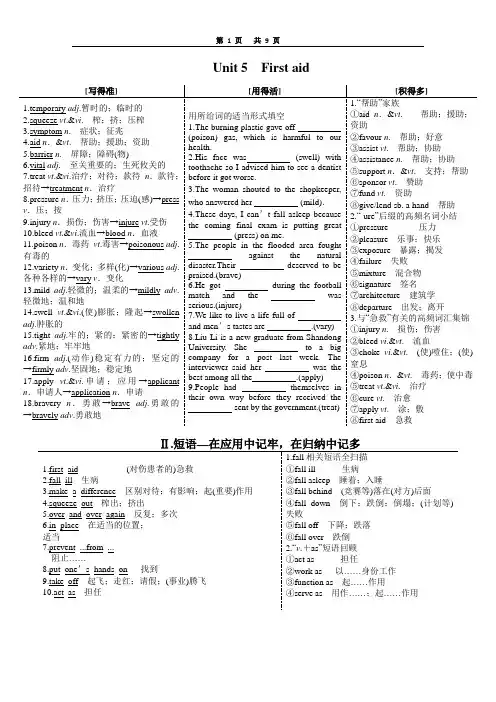
Unit 5First aid1.temporary adj.暂时的;临时的2.squeeze vt.&vi. 榨;挤;压榨3.symptom n. 症状;征兆4.aid n.&vt. 帮助;援助;资助5.barrier n. 屏障;障碍(物)6.vital adj. 至关重要的;生死攸关的7.treat vt.&vi.治疗;对待;款待n.款待;招待→treatment n.治疗8.pressure n.压力;挤压;压迫(感)→press v.压;按9.injury n.损伤;伤害→injure vt.受伤10.bleed vt.&vi.流血→blood n.血液11.poison n.毒药vt.毒害→poisonous adj.有毒的12.variety n.变化;多样(化)→various adj.各种各样的→vary v.变化d adj.轻微的;温柔的→mildly adv.轻微地;温和地14.swell vt.&vi.(使)膨胀;隆起→swollen adj.肿胀的15.tight adj.牢的;紧的;紧密的→tightly adv.紧地;牢牢地16.firm adj.(动作)稳定有力的;坚定的→firmly adv.坚固地;稳定地17.apply vt.&vi.申请;应用→applicant n.申请人→application n.申请18.bravery n.勇敢→brave adj.勇敢的→bravely adv.勇敢地用所给词的适当形式填空1.The burning plastic gave off __________(poison) gas, which is harmful to ourhealth.2.His face was__________ (swell) withtoothache so I advised him to see a dentistbefore it got worse.3.The woman shouted to the shopkeeper,who answered her __________ (mild).4.These days, I can’t fall asleep becausethe coming final exam is putting great__________ (press) on me.5.The people in the flooded area fought__________ against the naturaldisaster.Their __________ deserved to bepraised.(brave)6.He got __________ during the footballmatch and the __________ wasserious.(injure)7.We like to live a life full of __________and men’s tastes are __________.(vary)8.Liu Li is a new graduate from ShandongUniversity. She __________ to a bigcompany for a post last week. Theinterviewer said her __________ was thebest among all the__________.(apply)9.People had __________ themselves intheir own way before they received the__________ sent by the government.(treat)①aid n.&vt.帮助;援助;资助②favour n. 帮助;好意③assist vt. 帮助;协助④assistance n. 帮助;协助⑤support n.&vt. 支持;帮助⑥sponsor vt. 赞助⑦fund vt. 资助⑧give/lend sb. a hand帮助2.“-ure”后缀的高频名词小结①pressure压力②pleasure 乐事;快乐③exposure 暴露;揭发④failure 失败⑤mixture 混合物⑥signature 签名⑦architecture 建筑学⑧departure 出发;离开3.与“急救”有关的高频词汇集锦①injury n. 损伤;伤害②bleed vi.&vt. 流血③choke vi.&vt. (使)噎住;(使)窒息④poison n.&vt. 毒药;使中毒⑤treat vt.&vi. 治疗⑥cure vt. 治愈⑦apply vt. 涂;敷⑧first aid 急救Ⅱ.短语—在应用中记牢,在归纳中记多1.first_aid(对伤患者的)急救2.fall_ill 生病3.make_a_difference 区别对待;有影响;起(重要)作用4.squeeze_out 榨出;挤出5.over_and_over_again 反复;多次6.in_place 在适当的位置;适当7.prevent_...from_...阻止……8.put_one’s_hands_on 找到9.take_off 起飞;走红;请假;(事业)腾飞10.act_as 担任1.fall相关短语全扫描①fall ill生病②fall asleep 睡着;入睡③fall behind (竞赛等)落在(对方)后面④fall down 倒下;跌倒;倒塌;(计划等)失败⑤fall off 下降;跌落⑥fall over 跌倒2.“v.+as”短语回顾①act as担任②work as 以……身份工作③function as 起……作用④serve as 用作……;起……作用1.Remove clothing using scissors if necessary unless it is stuck to the burn. 除非衣服紧贴在烧伤面上,否则都要把衣服脱掉。
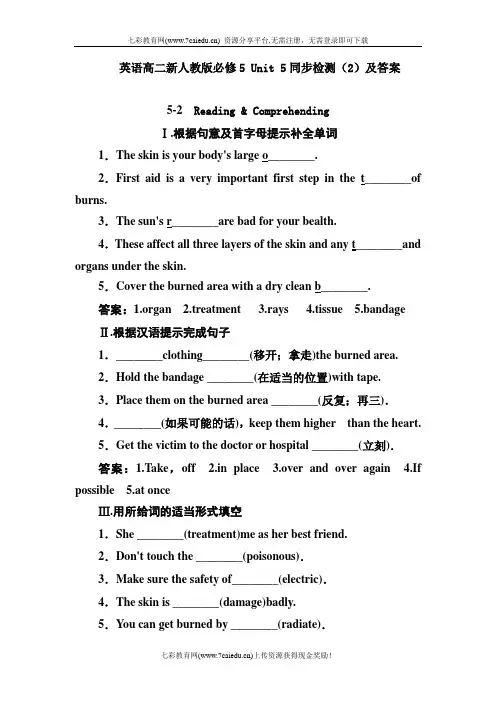
英语高二新人教版必修5 Unit 5同步检测(2)及答案5-2 Reading & ComprehendingⅠ.根据句意及首字母提示补全单词1.The skin is your body's large o________.2.First aid is a very important first step in the t________of burns.3.The sun's r________are bad for your bealth.4.These affect all three layers of the skin and any t________and organs under the skin.5.Cover the burned area with a dry clean b________.答案:an 2.treatment 3.rays 4.tissue 5.bandageⅡ.根据汉语提示完成句子1.________clothing________(移开;拿走)the burned area.2.Hold the bandage ________(在适当的位置)with tape.3.Place them on the burned area ________(反复;再三).4.________(如果可能的话),keep them higher than the heart.5.Get the victim to the doctor or hospital ________(立刻).答案:1.Take,off 2.in place 3.over and over again 4.If possible 5.at onceⅢ.用所给词的适当形式填空1.She ________(treatment)me as her best friend.2.Don't touch the ________(poisonous).3.Make sure the safety of________(electric).4.The skin is ________(damage)badly.5.You can get burned by ________(radiate).答案:1.treats 2.poison 3.electricity 4.damaged5.radiationⅣ.单项填空1.Your words ________her feelings badly. Why not apologize to her?A.hurt B.injureC.wound D.ruin答案:A“伤害”感情用hurt。
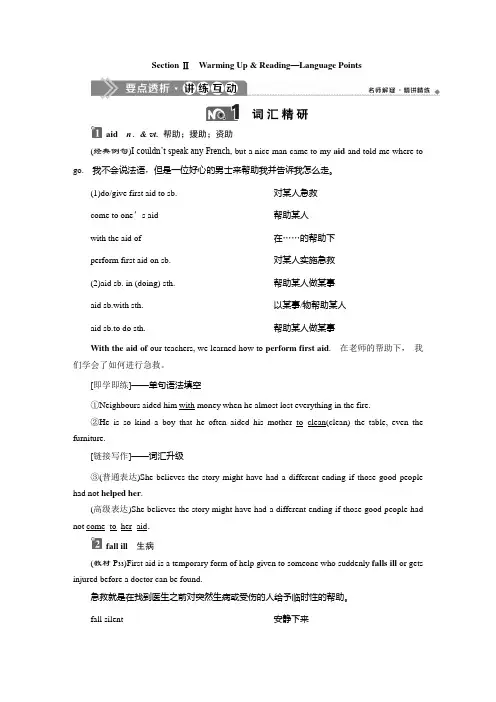
Section ⅡWarming Up & Reading—Language Pointsaid n.& v t.帮助;援助;资助(经典例句)I couldn’t speak any French, but a nice man came to my aid and told me where to go.我不会说法语,但是一位好心的男士来帮助我并告诉我怎么走。
(1)do/give first aid to sb. 对某人急救come to one’s aid 帮助某人with the aid of 在……的帮助下perform first aid on sb. 对某人实施急救(2)aid sb. in (doing) sth. 帮助某人做某事aid sb.with sth. 以某事/物帮助某人aid sb.to do sth. 帮助某人做某事With the aid of our teachers, we learned how to perform first aid.在老师的帮助下,我们学会了如何进行急救。
[即学即练]——单句语法填空①Neighbours aided him with money when he almost lost everything in the fire.②He is so kind a boy that he often aided his mother to_clean(clean) the table, even the furniture.[链接写作]——词汇升级③(普通表达)She believes the story might have had a different ending if those good people had not helped her.(高级表达)She believes the story might have had a different ending if those good people had not come_to_her_aid.fall ill生病(教材P33)First aid is a temporary form of help given to someone who suddenly falls ill or gets injured before a doctor can be found.急救就是在找到医生之前对突然生病或受伤的人给予临时性的帮助。
高中英语必修五第五单元练习题一、写出下列单词或短语的基本含义。
1.first aid________________________2.temporary(adj.)_______________________3.injury(n.)______________________4.bleed(v.)_______________________5.cupboard(n.)____________________6.barrier(n.)______________________7.poison(n./v.)_____________________plex(adj.)____________________9.a variety of_____________________dly(adv.)_____________________11.solid(n.)________________________ liquid(n.)____________________12.electric shock______________________ shock(v.)_______________________13.swell(v.)______________________14.scissors(n.)______________________15.unbearable(adj.)__________________16.squeeze out_____________________17.bandage(n.)______________________18.in place_______________________19.vital(adj.)____________________20.symptom(n.)___________________ symbol(n./v.)___________________21.pour(v.)_______________________22.tightly(adv.)____________________ firmly(adv.)____________________23.a number of____________________ the number of___________________24.put one’s hands on_____________________25.treat(n./v.)______________________26.apply to______________________ apply for_____________________27.make a difference___________________二、选词填空。
人教版高中英语必修五Unit5练习试卷及答案第一部分语言知识及应用(共两节,满分45分)第一节:完形填空(共15小题;每小题2分,满分30分)阅读下列短文,掌握其大意,从每题所给的四个选项中选出最佳选项。
We all have a heart that is already accurately showing us how true things are.Carmen's mother Maria had just ____1___ a serious heart attack.But without a heart transplant (移植) her life was in constant____2____.Both the mother and daughter knew that the chances were very____3____:finding a donor heart that matched Maria's blood type could take years.However,Carmen was determined to save her mother.She kept___4___hospitals all over the country.Days stretched out.By Christmas,Maria had trouble walking from one end of the room to the other.Carmen lost all hope.She fell into a corner of thehospital____5____.“Are you okay?” a man asked.Carmen sobbed as she told the stranger her___6___.This middleaged man was named Frank,whose wife,Cheryl,a tender and devoted mother of four lovely children,had been in hospital with a brain disease and wouldn't ___7___it through the night.___8___,an idea came to Frank's mind.He knew Cheryl had always wanted to donate something from herself.After reviewing the data,doctors__ 9___Frank that his wife's heart was by some miracle a perfect fit for Carmen's mother.They were able to10the transplant.That cold night,when Cheryl was____11____dead,Frank came to knock at Maria's door.She was____12____for Frank's family as she had been doing every day recently.Though Maria had never met Frank before,they both felt a strange bond as they hugged and cried.On New Year's Eve,Carmen ____13____Cheryl's funeral (葬礼) with Frank's family,who were singing their favorite song “My heart will go on”.One day later,on New Year's Day,Maria___14____with Cheryl's heart.Yes,Cheryl's loving heart would go on,for it was____15____in another loving mother's chest.1.A.suffered B.survived C.died D.made答案:B根据But without a heart transplant (移植) her life was in constant可知母亲是经过心脏移植手术后活了下来选B。
Unit 5 随堂练习1、I don’t doubt ________ our country is playing a more and more important role in international affairs.2、There is some doubt _______ their football team will win the match.3、When harvest time came around, he was always selling vegetables in the market ___________ people from the town met regularly.4、It was not until near the end of the letter ____________ she mentioned her own plan.5、The doctors discussed various approaches to the ______________ (treat) of his disease and got a good plan.6、If plastic and rubber are burnt, they’ll give off ____________(poison) gases.7、She was taken to hospital with serious head _____________ (injure) yesterday.8、Mr. Black found his lovely pet dog in the garden with terribleknife (wound).9、His play was popular and every time _______________ (talk) about it he owed his success to the support of his friends.10、If _____________ (possibility), I’d like to work in the Ministry of Finance because I am good at mathematics and know much professional knowledge about finance.11、Tom wanted to play football with his friends in the street, but his father told him not _____.12、Knowing his trouble, I had nothing to do but __________ (inspire) him to continue his work.13、He rushes out of the room as if _____________ (meet) some important person.14、Though _____________(surprise) to see us,the old man gave us a warm welcome.15、—Mary, how about going to the movies after supper?—________________ (sound) great.16、Americans recognize that there is a past on which the present rests. But they have not developed their sense of the depth of time as much as this has been done in theMiddle East and South Asia. The Arab looks back two to six thousand years for his own origins. History is used as the basis for almost any modern action. The chances are that an Arab won't start a talk or a speech or analyze a problem without first developing the historical aspects of his subject. The American assumes(认为)that time has depths but he seldom stresses its importance.The American never questions the fact that time should be planned and future events should be fitted into a schedule. He thinks that people should look forward to the future and not talk too much on the past. His future is not very far ahead of him. Results must be obtained in the foreseeable future — one or two years or, at the most, five or ten. Promises to meet deadlines and appointments are taken very seriously. There is real punishment for being late and for not keeping commitments(承诺) in time. The American thinks it is natural to calculate the value of time. To fail to do so is unthinkable. The American calculates how much time is required to do everything. ” I’ll be there in ten minutes.” It will take six months to finish that job." "I will be in the army for four and a half years."The Americans, like so many other people, also use time as a link that chains events together. If one event occurs on the heels of another, we will certainly try to find a causal relationship between them. If A is see n around the area of B’s murder shortly after the crime has been committed we automatically form a connection between A and B. However, events which are separated by too much time are difficult for us to connect them in our minds. This makes it almost impossible for us as a nation to engage long-range planning.1. How do Americans see past time according to the first paragraph?A. It’s valueless.B. It's limited.C. It reflects today.D. It helps start a talk.2. What does the underlined phrase "to do so" in Paragraph 2 refer to?A. To calculate the value of the past.B. To plan a schedule for future events.C. To figure out the importance of time.D. To meet deadlines and appointments.3. When will Americans chain two events together?A. When common evidence is found.B. When the two events happen one by one.C. When A is found near the scene of B's crime.D. When one event happens long after another.17、A ten-year-old boy from Howell, Michigan is being praised as a hero thanks to his persistence(坚持) that led to saving the life of an elderly neighbor. The event happened late in an evening when Danny DiPietro was being driven home from hockey practice by his mom.That's when the young boy noticed an open garage(车库) and a figure that he believed was a dog outside an apartment building near his house. Given the freezing weather, the young boy got a feeling that something was not right. But instead of dismissing it like most kids at his age, he insisted that his mother, Dawn, find out what was going on. Dawn tried to make Danny believe that no one would leave a dog out in such cold weather, hut he refused to take no for an answer.Dawn finally gave in and decided to drive to the area with the family dog and see if there was any truth in Danny’s hunch(直觉). Sure enough, as she got closer to the apartment building she noticed a garage that was wide open and someone waving madly for help. Upon getting there, she realized that it was not a dog the young boy had seen, but Kathleen St. Onge. The 80-year-old woman had fallen down on some ice in front of her garage and had been lying there for two hours, unable to get up.Dawn called 911 at once. The two then returned with some blankets to cover Ms. St. Onge, while they were waiting for the ambulance to arrive. Though still in hospital, the elderly woman is recovering well and forever grateful to Danny for following his hunch!1. When seeing a figure in front of an open garage, Danny ________.A. recognized it was an old womanB. thought it was a homeless dogC. realized something was wrongD. believed it was nothing important2. When Dawn got closer to the garage, she __________.A. noticed the dog had gone awayB. knew Danny’s hunch wasC. found an old lady waving for helpD. felt something must have been stolen3. Which of the following can best describe Danny?A. Brave and patient.B. Friendly and honest.C. Considerate and positive.D. Persistent and warm-hearted.4. What could be the best title for the passage?A. Always Follow Your HunchB. Be Ready to Help Save the ElderlyC. An unknown Hero Brings Love and HopeD.A 10-year-old Boy Saved His Elderly Neighbor's Life18、假定英语课上老师要求同桌之间交换修改作文,请你修改你同桌写的以下作文。